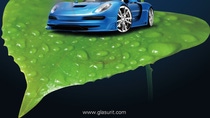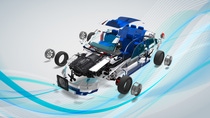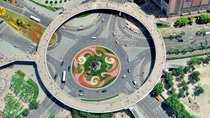Colorful cars start from green

On elevated expressways, cars coated with gorgeous paints can make a city more vibrant and colorful.
While it may have never occurred to you, the coating process, which is responsible for the various colors on cars, is one of the most energy-intensive processes in industrial automotive manufacturing. It also emits a large number of volatile organic compounds (VOC) and CO2. The former is the main source of PM2.5, while the latter is one of the main causes of global warming.
As one of the leading automotive coatings suppliers in the world, BASF has had extensive and in-depth cooperation with car manufacturers around the globe, not only in research of color design and trends to make cars look fashionable, but also in being actively involved in the coating process, exploring eco-friendly automotive coatings, coating processes and solutions. This is to help car manufacturers tackle the severe challenges of balancing economic effectiveness and ecological efficiency.
Located in Shenyang, Liaoning, the Tiexi plant of BMW Brilliance is one of the most eco-friendly and sustainable paint shops in the world, albeit with the lowest energy consumption. As one of the major coating suppliers of Tiexi plant, BASF provides advanced and eco-friendly e-coat and waterborne basecoat. Through the streamlined Integrated Process (IP), BASF helps the Tiexi plant reduce production costs and the consumption of raw materials and energy, effectively control the emission of VOC and CO2 and increase productivity.
The entire paint system of a car, at one tenth of a millimeter, is no thicker than a human hair but consists of four layers, including e-coat, primer, basecoat and clearcoat. Generally, it can only be completed after a four-step process, which has very high requirements on the space of the paint shop and energy consumption.
As there are no set rules in the world, why not find a win-win solution that cuts both costs and protects the environment? BASF loves such challenges. Based on study of the whole coating process, BASF found that primer could be reduced. If feasible, the original four-step coating process can be streamlined to three steps.
However, it is not a simple question of four minus one. The effects of primer need to be considered. The UV light in the atmosphere can penetrate layers of clearcoat and basecoat and make light-sensitive e-coat crack and peel. Primer helps protect e-coat from UV light and flattens the surface of coatings to prevent it from stone chipping.
Based on such considerations, BASF innovated and optimized the coating process, developing the IP, incorporating part of the functions of primer into the waterborne basecoat system. With the innovative e-coat CathoGuard® 800, the primer and drying steps are saved with the same effect of the original four-step process.
Compared with the standard process, the streamlined IP effectively shortens the production line and coating process. It reduces the use of raw materials, cuts up to 20% energy consumption and CO2 emission, and minimizes the use of solvents and thus the VOC emission. It also help car manufacturers increase productivity and improve the balance between energy consumption and eco-system conservation. In terms of both profit-making and environmental protection, the IP has significant advantages.
The Tiexi plant of BMW Brilliance is the second BMW plant in the world to implement the IP. Thanks to the IP, both initial investment and labor costs were reduced by around 30%. In addition, energy and water consumption, VOC emission and wastewater discharge were one-third of the average of 10 years ago, all of which were major breakthroughs in sustainable development.
From construction to start-up, BASF not only provided the overall coating solutions but also sent experienced engineers to the site. They were involved in the installation, implementation and testing together with the BMW Brilliance team and other suppliers until the Tiexi plant started production successfully. This ensured the continuously stable production of the paint shop.
“Innovative technologies and building up partnerships with suppliers are very crucial to BMW Brilliance,” said Chen Weihua, the paint shop director at the Tiexi plant of BMW Brilliance. “We are so impressed that BASF is customer-oriented, offering professional technologies and services and striving for excellence.”
“Dedicated to continuous innovation, BASF delivers advanced automotive coatings solutions with the best-in-class services to our customers. We will continuously support their long-term, sustainable development,” said Dr. Thierry Herning, General Manager, BASF Shanghai Coatings Co., Ltd.
Paint shops of car manufacturers plants newly established in these two years can directly adopt the IP, while for existing plants, primer and basecoat processes can also use the IP after certain reconstruction. In addition to the Tiexi plant of BMW Brilliance, many major car manufacturers in China have adopted BASF’s IP.
Eco-friendly CathoGuard® 800
“Tiexi plant is the first BMW plant in the world adopting CG800. Since the successful launch in 2013, the e-coat tank continues to improve the quality of our products and contributes to our sustainable development.”
Chen Weihua, paint shop director at the Tiexi plant of BMW Brilliance
E-coat is indispensable in the coating process of automotive bodies. It provides the bodies in white with the primer coat, which is the basis for the following layers of coating and efficiently protects surfaces, edges and cavities from corrosion. The IP without primer requires e-coat to be more powerful. This is where BASF’s CathoGuard® 800 (CG800) demonstrates its value.
BASF’s CG800, a leading e-coat around the world, is not only rust-resistant, but also low in solvent and free of heavy metal and HAP. Therefore, it won’t cause air pollution and is very environmental-friendly. More importantly, its optimized distribution of the film resulting in a homogenous thickness saves material. The multi-metal compatibility of CG800 means fewer touch-ups on the car body and ensures high quality and reliable technical process during manufacturing. Moreover, the coating does an outstanding job on any substrates and can be combined with state-of-the-art pretreatment technologies, including the new nickel-free “nano” pretreatment.
Since its launch in 2009, CG800 has been widely applied across the world. Its superior features include eco-friendliness, energy efficiency, excellent throwing power, high-corrosion resistance and high-surface quality. With its wide applications around the world, CG800 has been well recognized by car manufacturers.
In 2011, BASF introduced CG800 into China and soon won the recognition of major car manufacturers. Shanghai GM was the first car manufacturer in the country to adopt CG800.
At the Tiexi plant of BMW Brilliance, as part of the IP, the paint shop maximizes the utilization of CG800 by turning 360°. This helps to save more space in the paint shop and is energy-saving and eco-friendly. Due to the reduction of wastewater discharge and energy consumption, the production cost of each car is significantly reduced.
“BASF’s CG800 can fully meet the most demanding requirements of BMW Brilliance on automotive coating,” said Chen. “Tiexi plant is the first BMW plant in the world adopting CG800. Since the successful launch in 2013, the e-coat tank continues to improve the quality of our products and contributes to our sustainable development.”
“With our latest technologies, innovative and eco-friendly paints, coating solutions and processes, BASF will help our clients to achieve a balance of cost and eco-efficiency, and support the growing automotive industry in China.”
Dr. Thierry Herning, General Manager, BASF Shanghai Coatings Co., Ltd
Eco-efficiency in the global automotive industry plays an increasingly important role. China is the world’s largest car production market, while regulations and emissions standards in the automotive industry are continuing to tighten. Since 2012, the Chinese government has put waterborne primer and waterborne basecoat as a mandatory requirement for new sedan manufacturing. In 2015, the Beijing municipal government issued an “Emission Standard of Air Pollutants for Painting of Automotive Manufacturing Industry”. It is considered the world’s most strict local standard of VOC emission for industrial painting so far.
Over the past few years, BASF has conducted a comprehensive Eco-Efficiency Analysis of the application process, looking at the environmental impact in proportion to the cost-effectiveness of painting production and painting technologies. Such analysis helps quantify and visualize sustainable development. It also allows BASF to provide its customers with the best possible advice with consideration to both ecological and cost efficiency. It identifies further potential for improvement in automotive painting processes and contributes to sustainable development.
The study shows that compared with solvent-borne paints, waterborne processes involve significantly lower emissions of VOC and therefore show overall good results with respect to eco-friendliness. Benefiting from the eco-efficiency analysis, BASF has continuously developed waterborne, solvent-reduced or solvent-free paint systems, pioneering in waterborne paints in automotive OEMs. BASF was the first coatings supplier to introduce waterborne basecoats to China in 2005.
“With our latest technologies, innovative and eco-friendly paints, coating solutions and processes, BASF will continue to work together with our clients to achieve a balance of cost and eco-efficiency, and support the growing automotive industry in China,” said Dr. Herning.



